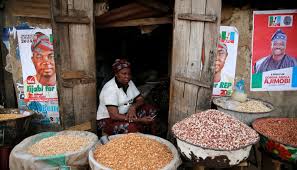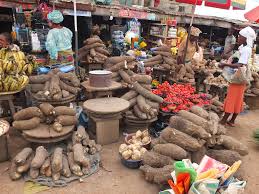Gratitude Joseph has been making enough money to feed her son and pay for his education by weaving purses, sandals, and jewelry. But since November, she and her kid have been going to bed hungry every night as a result of her customers stopping to visit.
She is one of millions of people in the biggest economy in Africa struggling with the greatest cost of living crisis in decades, which has gotten worse since President Bola Tinubu took office in May and implemented audacious but unpopular economic changes.
Joseph stated that whereas she could easily make 30,000 naira ($18.83) a week last year, she will now be lucky to make 5,000 naira.
“Orders were once placed by people. I used to design for them and occasionally even manufacture gifts for weddings, but right now I’m not getting orders for those things,” the 29-year-old Abuja resident stated.
“It has been very, very difficult, especially that I have a son and he needs to go to school, he needs to eat.”
When Tinubu took control, the economy was already beset by record levels of debt, high unemployment, low oil production, government funds being depleted by subsidies, and growth being stifled by power shortages.
Laptops 1000Nigeria imports petroleum and food, and as it emerged from a COVID-19-induced recession in 2020, it was hit hard by rising world costs as a result of the conflict between Russia and Ukraine.
However due to severe dollar shortages, inflation has surged to its highest level in thirty years, and the value of the naira is falling to all-time lows. Household budgets are being squeezed by the skyrocketing costs of food, cooking gas, medicines, fuel, and public transportation.
Following a staff visit, the International Monetary Fund stated on March 4 that “addressing rising food insecurity is the immediate policy priority,” given that 8% of Nigerians are considered food insecure.
The issues facing Nigeria have also permeated the boardrooms of businesses.
Amid challenging operating conditions and the depreciating value of the naira, multinational corporations such as Procter & Gamble and pharmaceutical manufacturers GSK Plc and Bayer AG have decided to cease production in Nigeria and instead engage third parties to market their goods.
The largest telecom company in Africa, MTN Group, announced a sharp decline in full-year earnings, attributing it to the depreciation of the naira. This development caused soap manufacturer PZ Cussons Plc. to release a profit warning.
A GROWTH IN FOOD PRICE
Farouk Dalhatu, a tomato vendor in Lagos’ Agodo market, just finished serving his first customer in eight hours. For this time of day, the market is usually bustling with traders and customers bargaining over prices, but it is surprisingly calm.
From 12,000 naira in December to 55,000 naira presently, or over twice the national minimum wage, a basket of tomatoes costs. Several of Dalhatu’s acquaintances were compelled to leave the market as a result.
Laptops 1000He pointed to a few empty stalls and remarked, “They are just trying to find what they can eat now and not do the tomato business.” Inflation is primarily caused by rising food costs.
A protracted Islamist insurgency, conflicts between farmers and herders, and widespread insecurity in regions that produce food—such as kidnappings for ransom by armed groups—are aggravating the situation by preventing many farmers from working in their crops.
Muda Yusuf, CEO of business advocacy group Promotion of Private Enterprise, stated, “We have an emergency on our hands in terms of the social consequences of this reform, in terms of this food insecurity.” He was alluding to the reforms involving gasoline subsidies and currency.
To force a tenfold increase in the minimum wage, labor unions spearheaded several protests last month and even threatened to shut down the entire nation.
In response, countrywide discussions on a new monthly minimum wage, which has been set at 30,000 naira since 2019, were launched by the government on Thursday.
Although Tinubu’s administration has declared giving cash, food, fertilizer, and seed to needy people, a spokeswoman for the presidency declined to comment.
Unions claim that this is insufficient and that the emphasis should instead be placed on “substantive issues” that have been discussed since June 2023 with the administration.
The Nigeria Labor Congress said in a statement that “these include critical matters such as wage increases, social welfare programs, infrastructure development, and the revitalization of key sectors such as education and healthcare.”
In Abuja, Joseph’s only priorities are running a successful business and supporting her kid.
She shrugged over empty pans and replied, “I am just thinking about what he will eat when back from school.”





















